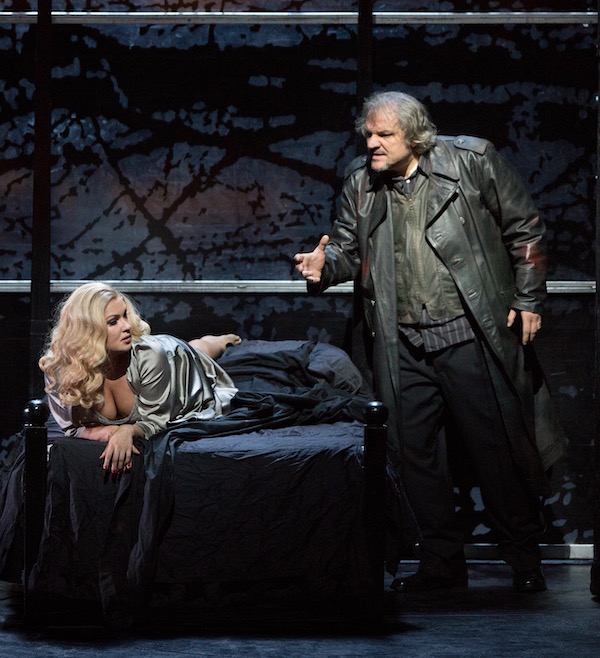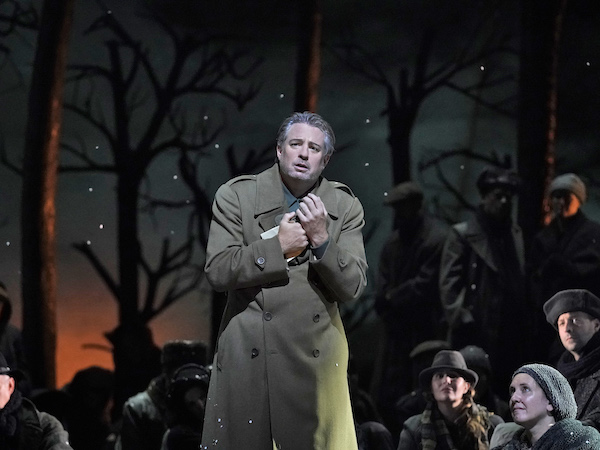A transfixing Netrebko awakens Met’s tired, post-Domingo “Macbeth”

“In tonight’s performance of Macbeth, the title role will be sung by Željko Lučić, replacing Plácido Domingo.” Were it not for that unassuming program insert, you might not have known that Wednesday evening’s performance of Verdi’s Macbeth was a historic one at the Metropolitan Opera—albeit notable more for who wasn’t on the stage than who was.
After a protracted saga that turned into a months-long will-he-or-won’t-he spectacle, Plácido Domingo finally withdrew from Wednesday’s performance with just over twenty-four hours’ notice, amid growing pressure over mounting allegations of sexual harassment.
Predictably, the allegations have caused deep divisions in the world of opera, between those committed to rooting out sexual misconduct in the industry and Domingo’s legions of admirers who stand by the legendary tenor.
But the one thing that everyone can agree on, it seems, is that the Met’s handling of the situation only made things worse. Whether the management asked Domingo to bow out voluntarily in the six weeks between the initial story and Tuesday’s announcement is unclear—they have declined to comment beyond a statement saying that his ultimate withdrawal was a mutual decision. Yet the Met was the only major American presenter not to immediately suspend or cancel its fall performances with Domingo once the charges became public. That allowed resentment to simmer within the company until furious musicians and staffers began making anonymous complaints to major news outlets, forcing the management’s hand at the last minute and leaving a shroud over the entire run.
In the event, there wasn’t much to overshadow in Wednesday night’s season premiere, though the performers can perhaps be excused under the circumstances. Željko Lučić, who was scheduled to take over the title role later in the run, has stepped in to cover Domingo’s three planned performances, as well. On Wednesday night the Serbian baritone looked and sounded exhausted from beginning to end. He lacked his usual consistency of tone, bellowing excessively in the early going and struggling to register in his soft voice. When he tried to rally his soldiers in Act IV, crying “la morte o la gloria!,” it sounded like a plea simply to get the fight over with.
Anna Netrebko, the remaining star attraction in the cast, did her best to compensate, feeding Lady Macbeth’s sense of aggravation with her husband’s fecklessness, though she let herself get carried away here and there. At times, it seemed as though she had decided to play the role as pure camp, while no one else had gotten the memo, leaving her alone to chew the scenery.
At her best, though, Netrebko showed the same captivating presence and vocal power that have made her performances so thrilling to watch over the years: her reprise of “Si colmi il calice” at the end of Act II’s banquet scene seethed with anger, as though to tell her husband “we’re going to stay here and have a good time, damn you.” Her sleepwalking scene was transfixing, showing the best qualities of her voice on a night that betrayed some wobbles and shaky intonation elsewhere. In “Una macchia è qui tuttora,” she boasted a full but clear upper range, thick velvet in her middle, and a bracing, meaty chest voice, crafting arching phrases and brilliant contrasts in a starkly dramatic rendition of the scene.

Tenor Matthew Polenzani gave a splendid performance as a dignified, warm-hearted Macduff. There was a bit of a cloud on his voice opening night, but he still showed bright vocal energy and exceptional musical sensitivity in his singing. His Act IV aria, “Ah, la paterna mano,” a moving tribute to his murdered wife and children, was the evening’s most emotionally subtle moment.
Otherwise, the evening saw competent if sleepy performances from the supporting cast. Ildar Abdrazakov was in excellent voice, rich and grainy, but his Banquo was rather nondescript, making his strongest impression in his non-singing appearances as a ghost. As Malcolm, tenor Giuseppe Filianoti sounded too weary to convince as the bright young hope of Scotland. Harold Wilson offered a warm, wooly bass as the Doctor, and Sarah Cambidge showed off a light and pleasing soprano in her debut as Lady Macbeth’s lady-in-waiting.
In the pit, Marco Armiliato sounded as tired as everyone else. While ensemble was generally tight, tempos were sluggish and energy lagged all night. In the banquet scene in Act II he finally found a little forward momentum, but lapsed back into ho-hum pacing after intermission.
The 2007 production by Adrian Noble is superficial and tacky. There are a handful of striking set images—notably Lady Macbeth’s bedchamber, with flanking columns that seem to stretch endlessly upward into the night—but the staging mostly makes half-hearted attempts at generic spookiness, often with comic results. The prophetic visions that appear before Macbeth in the woods are projected in what looks like a giant snow globe. As for the witches, they’re a pack of old ladies in slightly distressed knit jackets, waving their purses menacingly at passers-by and writhing for no apparent reason. There’s nothing terrifying or supernatural about them—they’re just plain weird, and not in the Shakespearean sense.
Macbeth runs through October 12 at the Metropolitan Opera. Anna Pirozzi appears as Lady Macbeth on October 1. metopera.org